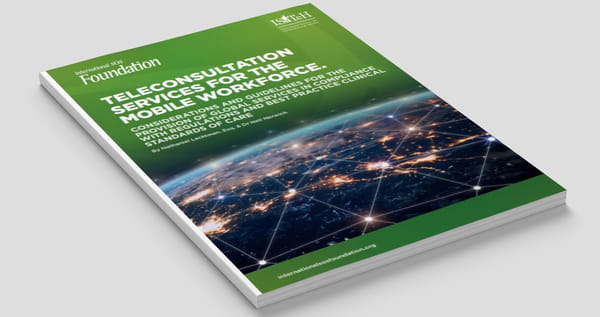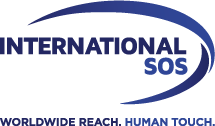GUIDE TO TELECONSULTATION SERVICES FOR THE MOBILE WORKFORCE
London
International SOS Foundation Launches New White Paper, endorsed by the International Society for Telemedicine and eHealth and authored by Leading Legal Authority, Nathaniel Lacktman, Esq. and the International SOS Group Medical Director for Assistance, Dr Neil Nerwich
London, 8 January 2019. As the global Telemedicine market increases rapidly1, the International SOS Foundation has produced a guidance paper ‘Teleconsultation Services for the Mobile Workforce; Considerations & Guidelines for the Provision of Global Services in Compliance with Regulations & Best Practice Clinical Standards of Care’. Endorsed by the International Society for Telemedicine and eHealth (ISfTeh), the paper provides multi-national organisations with insight into essential considerations when assessing a teleconsultation2 service. It is authored by Nathaniel Lacktman, Esq., Partner at leading law firm Foley & Lardner LLP where he is Chair of the firm’s Telemedicine and Digital Health Industry Team, and Dr Neil Nerwich, International SOS Group Medical Director, Assistance.
Nathaniel Lacktman, Esq., Partner at Foley and Lardner LLP, commented, “An estimated 96% of large companies in the USA alone provide access to teleconsultation services for their staff on a domestic basis3. Attention is now shifting to how it can be applied on a global basis to support multi-national organisations and their mobile, connected, and increasingly millennial, global travellers and expatriates. Teleconsultation services may seem like an easy solution to global medical care, but there are some major legal considerations that need to be assessed. When multi-national organisations are looking for the best practices to protect the health of mobile employees, they must consider the need for a service to have appropriate licensing and medical regulations at a patient’s location. Also the ability to provide any subsequent support, such as providing locally dispensable prescriptions, is critical.”

Prof. S. Yunkap Kwankam, PhD, Executive Director, International Society for Telemedicine and eHealth (ISfTeH), “It is clear that the future of health is digital health4 and it is an environment which, to date, has not kept pace with the changes and spread of information technology of other sectors. However, much remains to be done in terms of the regulatory environment within which digital health takes place. Industry players, governments and consumers alike need to recognise that we cannot simply transfer the consumer retail paradigm into the health care market. And major data breaches by hackers, sometimes involving the compromise of tens or hundreds of millions of data records, are only one aspect that adds fuel to these concerns. Insightful and guiding documentation such as the new ‘Teleconsultation Services for the Mobile Workforce’ are essential in the appropriate and safe implementation of such services.”
The ‘Teleconsultation Services for the Mobile Workforce’ paper includes;
- Country level review of legal requirements for the provision of teleconsultation and subsequent recommendations and treatment
- Guidelines on clinical best practices, taking into account details such as the understanding of a local healthcare environment, clinical expertise of current disease threats at the patients location and the integration into the local healthcare system when required
- Case studies demonstrating usage in both a corporate and educational sector scenarios
- List of global best practices to help guide multi-national organisations in assessing a teleconsultation service.
Dr Neil Nerwich, commenting on behalf of the International SOS Foundation, said, “Teleconsultation can be appropriate to a number of medical needs when delivered in consideration of medical best practice. It can successfully provide rapid access to care, thereby minimising time out of the working environment and the subsequent impact on business continuity. However, along with legal considerations, issues such as local medical knowledge and accessibility to local medical care resources when necessary need to be considered. Having an efficient and medically holistic way to support mobile employees wherever they are in the world is essential to business resilience. Our aim in producing this paper is to support organisations in identifying how to achieve this in the best way for their employees and business.”
To read the white paper, click here.
ENDS
Notes to Editors
1Global telemedicine market was valued at USD 32,842.48 million in 2017, is expected to witness a CAGR of 18.83% over the period, 2018-2023. https://www.mordorintelligence.com/industry-reports/global-telemedicine-market-industry
2Teleconsultation, a category of telehealth, describes the clinical practice of medicine directly between a physician and patient –delivered remotely, typically via video.
3https://www.businessgrouphealth.org/news/nbgh-news/press-releases/press-release-details/?ID=334
4Global policy declarations, such as the passage by the 71st session of the Word Health Assembly, of a resolution on Digital Health in May 2018
About International SOS Foundation
Celebrating 10 years as ambassadors for Duty of Care, the International SOS Foundation drives and promotes best practice in protecting employee safety, security, health and wellbeing. Through a range of groundbreaking thought-leadership, CPD and IOSH accredited training and expert led events, the Foundation helps to share vital insight, understanding, and practical risk mitigation measures. All employees need to be protected, at home or away, and the COVID-19 pandemic has created an evolving and complex Duty of Care landscape for organisations to navigate.
The Foundation is a registered charity. Initially launched with a grant from International SOS in 2011, it is now an independent, non-profit organisation.
For more information on Duty of Care and the International SOS Foundation, please visit http://www.internationalsosfoundation.org/
About The International Society for Telemedicine & eHealth (ISfTeH)
The International Society for Telemedicine & eHealth (ISfTeH) is a nongovernmental and not-for-profit society that services primarily as the umbrella association for national Telemedicine and eHealth organization. Geopolitically neutral and democratic, the ISfTeH exists to facilitate the international dissemination of knowledge in Telemedicine and eHealth and to provide access to recognized experts in the field worldwide. The main activities of the society are promotion and support of Telemedicine and eHealth activities worldwide, assisting the start-up of new national organizations and supporting developing countries in the fields of Telemedicine and eHealth.
About Foley & Lardner LLP
Foley & Lardner LLP looks beyond the law to focus on the constantly evolving demands facing our clients and their industries. With over 1,100 lawyers in 24 offices across the United States, Mexico, Europe, and Asia, Foley approaches client service by first understanding our clients’ priorities, objectives, and challenges. We work hard to understand our clients’ issues and forge long-term relationships with them to help achieve successful outcomes and solve their legal issues through practical business advice and cutting-edge legal insight. Our clients view us as trusted business advisors because we understand that great legal service is only valuable if it is relevant, practical and beneficial to their businesses.
On April 1, 2018, Foley combined with Gardere, Wynne & Sewell LLP. The combined firm operates as “Foley Gardere” in Austin, Dallas, and Houston, and as “Foley Gardere Arena” in Mexico City through its subsidiary, Gardere, Arena y Asociados, S.C. All other offices operate as Foley & Lardner LLP.


